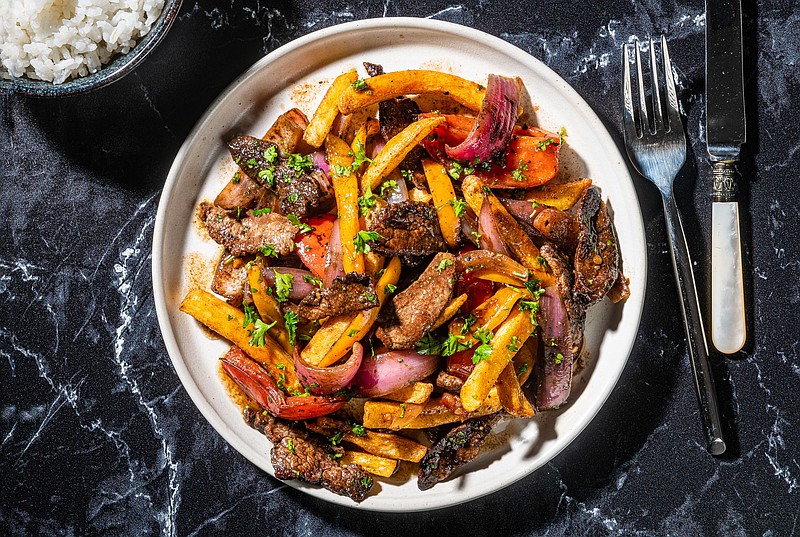Peruvian food is a magnificent melange of Indigenous, Spanish, Chinese and Japanese ingredients and techniques, and I love how this is illustrated in the dish we're having for dinner tonight: lomo saltado.
This recipe, from the Embassy of Peru, is true to the dish's style and substance. It's a classic example of Peruvian Chifa cuisine, a blend of Chinese technique and ingredients from Spain, as well as those native to the Peruvian mountains.
Classic lomo saltado is a literal translation of its Spanish name: A beef stir-fry. Beef, which came from Spain in the 1600s, sears nicely in a hot wok. But so do the other ingredients; it's the saltado part that's most important.
As Ricardo Zarate writes in his "The Fire of Peru," sometimes lomo saltado can have a bad reputation. "There are a lot of bad versions out there. It's hard not to be disappointed when a saltado has steamed instead of seared ingredients. That's a stew, not a stir-fry. The key is to fry everything at very high heat so you get a good sear on the ingredients, but you don't cook out all of their freshness."
True stir-frying is indeed critical to a successful saltado, but if you don't have a wok, you can absolutely still make this recipe in a heavy-bottomed skillet. To ensure you get a good sear on the food, be sure to crank the heat up until the pan starts to let off wisps of smoke before you add any food. Then, don't crowd the pan — fry everything in batches if necessary.
Lomo Saltado
- 1 pound beef tenderloin or skirt steak, sliced into 2-by-½-inch strips
- ¼ teaspoon fine salt
- 3 tablespoons vegetable oil
- 1 large red onion, cut into 12 thin wedges
- 2 aji amarillo chiles, seeded and sliced into thin strips (see note)
- 2 medium tomatoes, cut into eighths
- 2 tablespoons chopped fresh parsley, divided use
- 2 tablespoons balsamic vinegar
- 2 tablespoons soy sauce or tamari, preferably low-sodium
- Freshly ground black pepper
- 2 tablespoons pisco (optional)
- 1 tablespoon fresh lime juice (from 1 lime)
- 8 ounces cooked french fries, for serving
- 2 cups cooked white rice, for serving
Season the beef with the salt. In a wok or large skillet over high heat, add the oil and heat until it just begins to smoke. Add the beef and sear until it's deeply caramelized, about 2 minutes per side. Reduce the heat to medium-high. With a slotted spoon, transfer the beef to a plate and cover loosely with aluminum foil.
Add the onions to the same skillet and cook, stirring, until they begin to soften and their edges darken, 3 to 4 minutes. Add the chiles, tomatoes, 1 tablespoon of the parsley, the vinegar, soy sauce or tamari and a few cracks of pepper. Cook, stirring, until the tomatoes and chiles have softened, about 2 minutes.
Return the beef and any accumulated juices to the wok or skillet and toss gently to combine. Reduce the heat to low. If using the pisco, add it and then use a long-handled lighter to ignite the sauce. Let it burn briefly to let the alcohol evaporate. Remove from the heat and sprinkle with the remaining parsley and the lime juice.
Toss with the french fries, and serve family-style, with rice on the side.
Makes 2 to 4 servings.
Note: Aji amarillo chiles is found fresh or frozen at Latin American markets. Substitute another mild chile, such as poblano or banana pepper, or, for a heatless alternative, a small yellow or red bell pepper.
